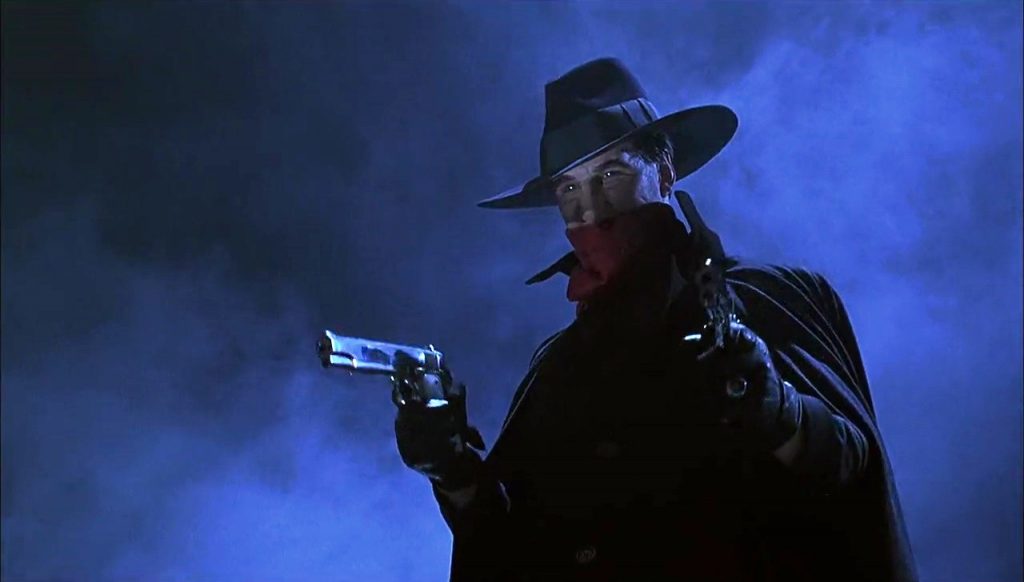The Shadow (1994)

Walter B. Gibson’s famous long-dormant character of the 1930s gets a 1990s update, primarily fitting in the mold of other crime-fighting superhero efforts like Batman and Darkman, both characters whose artistic origins are influenced by the original “Shadow” creation. In years past, The Shadow was primarily popular through radio programs, as well as in pulpy novels, comics from various publishers, a few films, and on television to a lesser extent. On radio, the Orson Welles-voiced character seems most at home, as the more mystery the main character is surrounded with, the more intriguing the power and storyline. The problem with this film version is that we never really feel like there’s more to know about the mysterious figure that we aren’t already introduced to, primarily because the film itself never seems particularly deep enough to handle a richer characterization.
The film starts off with Lamont Cranston (Baldwin, Malice) as a bad guy, spending his days as a ruthless warlord in post WWI Asia. A group of Tibetan monks end up kidnapping him, taking him to their monastery where they begin to teach him how to use his dark side as a means to fight evil, instead of propagating it. He soon discovers he has the ability to cloud other men’s minds, controlling their thoughts and rendering himself almost unseen among them. Years later, in New York City, Cranston leads a life of crime-fighting against thugs and gangsters, easily thwarting them at every turn, becoming a folk hero. He soon meets his ultimate match in Shiwan Khan (Lone, Rush Hour 2), the last descendant of Genghis Khan, who happens to share the same uncanny powers as The Shadow, except for using them for evil. With world domination in his sights, Shiwan controls the mind of a leading nuclear physicist (McKellen, Last Action Hero) to construct a nuclear time bomb that will help in his conquest to bring the world to his knees. With the help of the scientists daughter, Margo Lane (Miller, Year of the Comet), Cranston is in a race against time to make sure Shiwan never succeeds.
Style over substance is the name of former music video director Russell Mulcahy’s (Highlander, Highlander II) game, and if all you’re looking for is a stylish diversion, I suppose you could do worse than The Shadow. Of course, these days, you could do a great deal better, as once you scratch the one-layer surface of this film’s visual appeal, you’ll find nothing underneath to draw your interest. Garish special effects, nice retro costumes, and plenty of moody lighting dazzle the eyes, and yet, at no point do we ever feel a connection to any of it. For what it is, it isn’t bad, but it lacks any true distinction, which makes it a rather disposable form of entertainment for just about all audiences.
David Koepp, who would contribute to screenplays for a future big superhero flick, Spider-Man, as well as blockbusters like Jurassic Park and War of the Worlds, just never is able to see much to the story to bother with such things as characters to identify with and a story worth following. The only place left to go is into the humor department, as there are a few quips here and there that might be funny if they were set up properly, but Mulcahy’s delivery tends to favor gunfire and mayhem much more than dialogue, so these jokes do little but languish noticed but unappreciated. Silly items like vacuum tubes that run all over the metropolis just never catch the eye of anyone, but when a whole town doesn’t recognize that there is an invisible high-rise hotel in their midst, perhaps the entire city of New York is under a perpetual hypnotic spell of wide scale inobservance.
After a film like Batman, which wasn’t a great film but at least had its own style, a flick like The Shadow feels more like second-hand goods. Resembling its namesake, this Shadow follows the real deal closely, but only offers the form of its source rather than any substance.
— Previous movies featuring The Shadow include The Shadow (1937) and The Shadow Strikes (1940).
Qwipster’s rating: C
MPAA Rated: PG-13 for violence
Running Time: 108 min.
Cast: Alec Baldwin, John Lobe, Penelope Ann Miller, Peter Boyle, Ian McKellen, Tim Curry, Jonathan Winters
Director: Russell Mulcahy
Screenplay: David Koepp (based on the character created by Walter B. Gibson)
